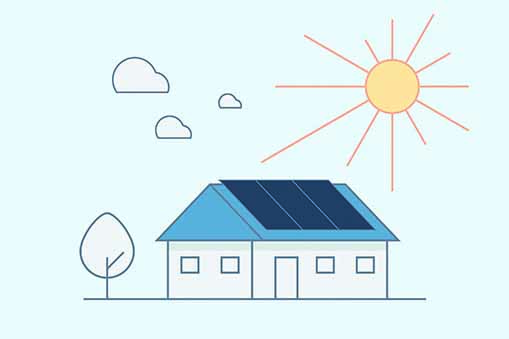By Kent Singer, CREA Executive Director –
Here’s a test. How many of you can define the term “net energy metering?” I bet those of you have installed rooftop solar panels or some other type of renewable energy source at your home understand the term. Even if you haven’t installed solar panels and don’t intend to, net energy metering, or NEM, still impacts you as an electric co-op member.
Simply put, NEM is the mechanism whereby utility customers receive credit for the renewable energy that they generate from facilities installed on the customer’s side of the meter. In most cases these systems are rooftop solar panels, but they can also be wind generators, biomass, small hydropower or other sources of renewable energy that a customer owns and maintains.
Over the course of a billing period, the amount of electricity produced by the member-owner’s renewable generator will be different from the amount of electricity from the co-op consumed by the member-owner. If the member-owner uses more energy from the co-op than he or she generates, the member-owner only pays for the “net” energy used from the co-op system. In this scenario, the member-owner of the co-op receives the retail value for each kilowatt-hour generated from the on-site system.
If, on the other hand, the member-owner’s renewable generator produces more electricity than he or she consumes in a given period, that energy goes out onto the co-op system and is used by other member-owners. The co-op is required to give credit to the member-owner for this excess energy produced, on a one-to-one basis, until the end of an annual true-up period. One of the key questions in the NEM debate is how to value any excess kilowatt-hours at the end of the true-up period. Under current Colorado law, electric co-ops get to decide how much to pay the member-owner for this “net excess generation” or NEG.
Colorado’s electric co-ops support the general concept of NEM (sometimes referred to as just net metering). Back in 2008, we worked with a group of stakeholders to pass H.B. 08-1160, the legislation that establishes the NEM rules for electric co-ops. H.B. 08-1160 basically requires that co-ops pay the retail value for energy that is produced to offset the member-owner’s consumption, but the co-op is authorized to determine the value of the excess kilowatt-hours in the manner deemed appropriate by the co-op. The bill also places caps on the size of customer-owned renewable generators so that co-op member-owners may only produce sufficient power to offset what they consume and not become power suppliers. The bill also authorized the Colorado Public Utilities Commission to establish rules for member-owners’ interconnections to co-op systems.
Over the last couple of years, many state legislatures and public utility commissions have been examining whether the existing rules for NEM are fair to both the utilities and to the customers who are producing power on their own premises. In Colorado, our Public Utilities Commission spent about 18 months examining NEM and considered testimony from many stakeholders. Last summer, the commission decided not to make any changes in the rules for net metering as they apply to the investor-owned utilities.
The Colorado Rural Electric Association appointed a Net Metering Task Force comprised of eight Colorado co-op CEOs. Over the next year or so, the task force will take a look at the current NEM law and develop policies and best practices for co-ops to consider as they work with co-op member-owners across the state. These positions will not be binding, but they are intended to assist the co-ops as they work with their member-owners in implementing NEM in the co-op service territories.
One of the critical questions is how NEM can be implemented without unfairly shifting costs from those member-owners who wish to install renewable generators to those who do not. The basic question is whether or not those member-owners who choose to install generation on their side of the meter are paying their share of the fixed costs of operating the co-op system.
There are many complicated technical and financial issues related to the topic of net metering and I plan to discuss more of these issues in future columns. Colorado’s electric co-ops support the integration of additional on-site renewable power sources, and we want to treat all member-owners in a fair manner while recovering the costs of operating your co-op’s system.

